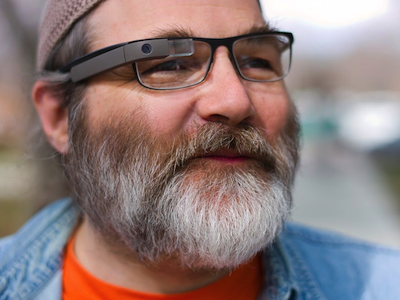Google Banning Facial Recognition Apps on Glass
For now, Google is not accepting apps with facial recognition.
The Google Glass team updated its Google Plus status with an announcement that, for now, facial recognition apps will not be allowed of the company's wearable tech. This is certainly good news for privacy advocates who have already grown weary over the thought that wearers could possibly take anyone's picture with just a blink of an eye.
"We've been listening closely to you, and many have expressed both interest and concern around the possibilities of facial recognition in Glass," the team states. "As Google has said for several years, we won’t add facial recognition features to our products without having strong privacy protections in place. With that in mind, we won’t be approving any facial recognition Glassware at this time."
"We’ve learned a lot from you in just a few weeks and we’ll continue to learn more as we update the software and evolve our policies in the weeks and months ahead,' Google adds.
The Glass policies now state that app developers can't use the camera or microphone to "cross-reference and immediately present personal information identifying anyone other than the user, including use cases such as facial recognition and voice print." Applications that do this will not be approved "at this time."
App developers are also prevented from turning off the little light above the eye (AKA the display) when the camera is in use. Thus, it must remain active or become active when taking a picture and stay active during a video recording so that non-Glass wearers are more aware that the specs are in use.
"We take security very seriously: we can suspend your application without notice if it appears to have a security or stability issue that could affect Google or its users," the company states.
Google's Glass update in regards to facial recognition arrives after Congress submitted a number of questions to Larry Page over privacy concerns related to Glass and its embedded camera. One of those focused on facial recognition which could possibly unveil personal information about anyone the Glass user is viewing. Would a user be able to request such information? Can a non-user or human subject opt out of this collection of personal data?
Get Tom's Hardware's best news and in-depth reviews, straight to your inbox.
"As members of the Congressional Bi-Partisan Privacy Caucus, we are curious whether this new technology could infringe on the privacy of the average American," the letter states. "Because Google Glass has not yet been released and we are uncertain of Google's plans to incorporate privacy protections into the device, there are still a number of unanswered questions that we share."
For now, it seems that Google has addressed that concern.

Kevin Parrish has over a decade of experience as a writer, editor, and product tester. His work focused on computer hardware, networking equipment, smartphones, tablets, gaming consoles, and other internet-connected devices. His work has appeared in Tom's Hardware, Tom's Guide, Maximum PC, Digital Trends, Android Authority, How-To Geek, Lifewire, and others.
-
superblahman123 I wonder how well these rules will apply to jailbroken Glass and a small piece of ducktape over the LED...Reply -
superblahman123 I wonder how well these rules will apply to jailbroken Glass and a small piece of ducktape over the LED...Reply -
aeurix I got into a discussion with my hardcore libertarian friend about something like this. It came down to basically anywhere your personal eyes can view, you should be allowed to record.Reply
So you could prevent trespassers from filming while on your property, by stopping them from entering your property (same with security at banks, top secret govt. agencies, etc.) if you didn't want it on camera.
I would love to have a Google Glass App that told me I was walking by a celebrity or famous scientist... -
superblahman123 Sorry for double post... hitting F5 after a post does not bode well as a preventative.Reply -
gm0n3y They are just holding back the tide with this. As soon as Glass goes public in an affordable way apps will come out for this immediately.Reply
Personally, I agree with aeurix's friend. It should be legal to record/analyze any sounds/images from public property. The only way to mostly prevent this is to completely ban any device that records video. -
Mike Honcho My mom told me I couldn't stay out past midnight when I was younger. Guess what? I did anyway. Stay classy Google. Privacy is overrated to you guys.Reply -
Mike Honcho My mom told me I couldn't stay out past midnight when I was younger. Guess what? I did anyway. Stay classy Google. Privacy is overrated to you guys.Reply -
neodude007 I am having a hard time seeing what is different about Glass vs a smartphone that can already do the same thing in terms of privacy. Are people freaking out about Glass simply because it is harder to tell WTF the person wearing them is making it do???! That seems sillly.Reply
Anybody can put their phone in video recording mode, hold it to their ear like they are talking and walk around a gym locker room and record faces/wangs. Glass is different how...? -
hoofhearted Sideload the Spokeo APK. It will hover a balloon over them with their income, street address, etc. Then a GPS style app the will show a virtual arrow going to their house like in Bioshock Infinite. Muggers should have an easier time picking their marks now.Reply
